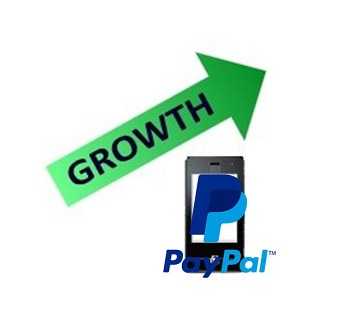The two companies have decided to work together to make it easier for consumers to use smartphones in-store.
PayPal Holdings Inc. has entered into a new mobile payment partnership with Citigroup Inc. The goal is to let customers easily use smartphones to pay for products and services at a checkout counter.
The agreement between the two companies will not impact PayPal’s main e-commerce business.
The PayPal online payments and peer-to-peer transactions will not be connected with the new mobile payment partnership. Instead, it will open up a new direction for the company to be able to participate in smartphone transactions. It offers the ability to carry out transactions with in-store purchases.
 This new agreement has raised certain questions about PayPal’s growth strategy. Some have questioned whether or not it has the potential to bring this business to a size that would rise above the lost fees.
This new agreement has raised certain questions about PayPal’s growth strategy. Some have questioned whether or not it has the potential to bring this business to a size that would rise above the lost fees.
PayPal’s CEO assures critics that the mobile payment partnership has taken this into account.
PayPal is offering deals to credit card issuers in order to provide incentives for using their new in-store mobile payments, said CEO Daniel Schulman. The company’s head of global core payments, Jim Magats, said “We talked about giving customers flexibility to pay how they want, and now we are rolling out new experiences.”
Citigroup and Fidelity National Information Services (FIS) will begin allowing customers to lead their credit cards into PayPal accounts. This will make it possible for point-of-sale mobile swipe technology. As Citigroup currently boasts 143 million customer accounts, this presents a considerable opportunity.
The idea is to “enable banking in the palm of our customers’ hands,” said Ralph Andretta, Citigroup card exec.
PayPal is also working with two smaller banks as a part of this mobile payment partnership through FIS. They include Wintrust Financial Corp. and Avidia Bank. This agreement is only the latest in a growing race among banks and credit card issuers to take hold of the mobile wallet market that has yet to move into mainstream use in the United States. Other massive participants include J.P. Morgan Chase & Co. as well as tech giants such as Google, Samsung and Apple.
The mobile space is driving the evolution of commerce as a whole
It has been 10 years since PayPal launched its first mobile payments service. To celebrate the anniversary of the service, the company has released information to show its exponential growth over its long history. This information is visualized in a chart that was released by PayPal earlier this week. According to PayPal CEO Dan Schulman, the mass adoption of mobile commerce has created a significant shift in the way people spend money. This has begun to change the nature of commerce with consumers relying more heavily on the digital space.
$66 billion in mobile transactions were processed by PayPal in 2015
According to PayPal, one-third of the 4.9 billion payments processed by the company last year were made through mobile devices. This accounts for some $66 billion in mobile transactions. The company believes that the growing prominence of mobile payments services will lead to a change in the commerce space over the next decade. This change may accelerate as more businesses begin supporting mobile transactions and shoppers relying on their smartphones and tablets.
Global mobile payments could reach $4 trillion by 2020
 In the United States, mobile commerce exceeded $100 billion in transactions in 2014. These transactions have continued to grow since, with more consumers becoming comfortable with the prospect of using mobile devices to make purchases. By 2020, mobile transactions could reach more than $4 trillion globally, according to IDC, a market research and analysis firm. With new payment services becoming more secure, more consumers are likely to participate in the mobile commerce space, giving PayPal and other companies new opportunities to expand their mobile initiatives.
In the United States, mobile commerce exceeded $100 billion in transactions in 2014. These transactions have continued to grow since, with more consumers becoming comfortable with the prospect of using mobile devices to make purchases. By 2020, mobile transactions could reach more than $4 trillion globally, according to IDC, a market research and analysis firm. With new payment services becoming more secure, more consumers are likely to participate in the mobile commerce space, giving PayPal and other companies new opportunities to expand their mobile initiatives.
Improved security makes consumers more comfortable with mobile commerce
Consumer adoption of mobile commerce has been heavily influenced by the security and convenience of payment services. Many had consider mobile transactions to be risky as they believed their financial information would be exposed to theft and exploitation. Indeed, some services have been impacted by major data breaches in the past, but these events have served to strengthen security in recent years, making mobile payments more attractive to consumers.
 This new agreement has raised certain questions about PayPal’s growth strategy. Some have questioned whether or not it has the potential to bring this business to a size that would rise above the lost fees.
This new agreement has raised certain questions about PayPal’s growth strategy. Some have questioned whether or not it has the potential to bring this business to a size that would rise above the lost fees.
 In the United States, mobile commerce exceeded $100 billion in transactions in 2014. These transactions have continued to grow since, with more consumers becoming comfortable with the prospect of using mobile devices to make purchases. By 2020, mobile transactions could reach more than $4 trillion globally, according to IDC, a market research and analysis firm. With new payment services becoming more secure, more consumers are likely to participate in the mobile commerce space, giving PayPal and other companies new opportunities to expand their mobile initiatives.
In the United States, mobile commerce exceeded $100 billion in transactions in 2014. These transactions have continued to grow since, with more consumers becoming comfortable with the prospect of using mobile devices to make purchases. By 2020, mobile transactions could reach more than $4 trillion globally, according to IDC, a market research and analysis firm. With new payment services becoming more secure, more consumers are likely to participate in the mobile commerce space, giving PayPal and other companies new opportunities to expand their mobile initiatives.